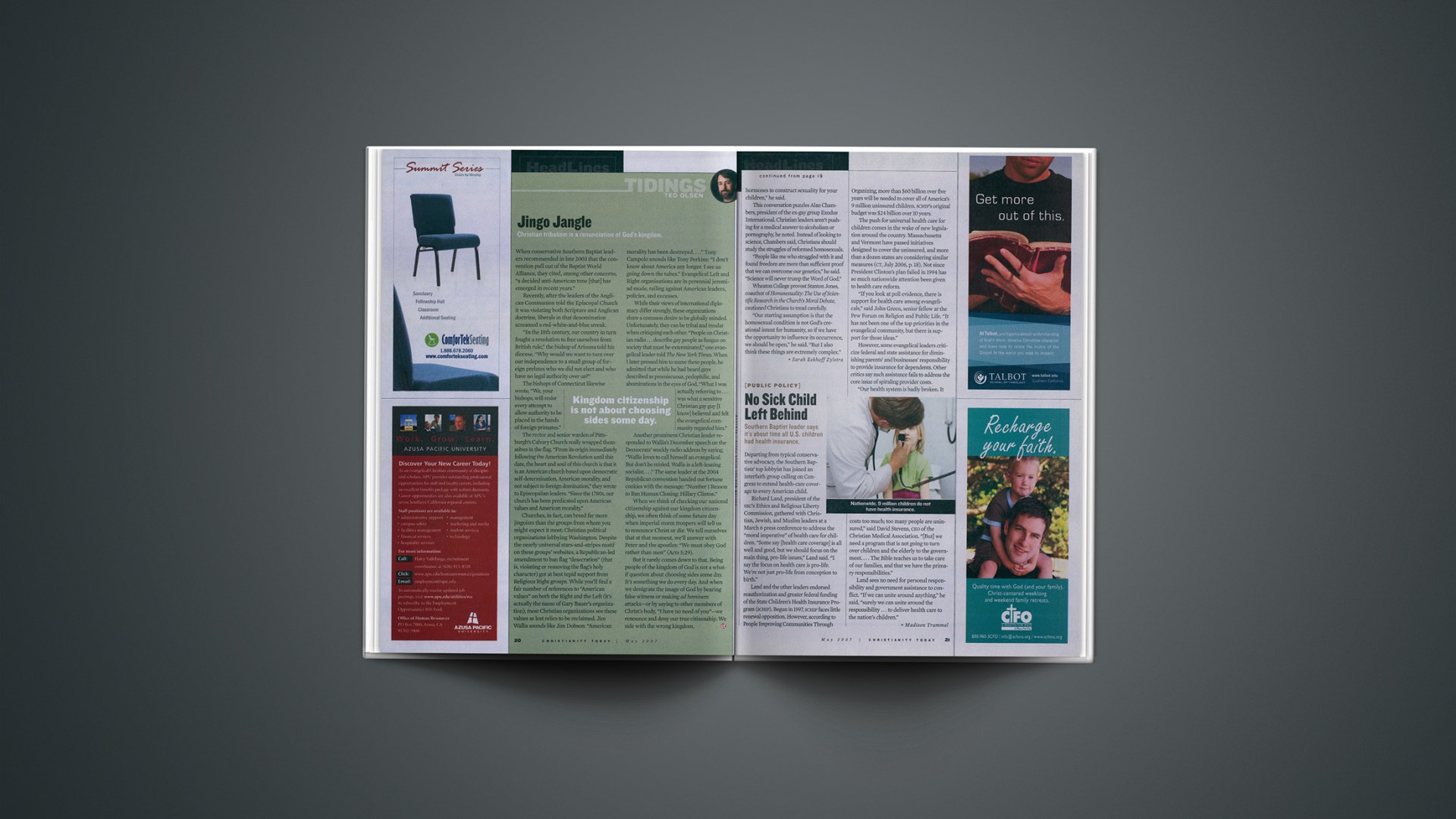When conservative Southern Baptist leaders recommended in late 2003 that the convention pull out of the Baptist World Alliance, they cited, among other concerns, “a decided anti-American tone [that] has emerged in recent years.”
Recently, after the leaders of the Anglican Communion told the Episcopal Church it was violating both Scripture and Anglican doctrine, liberals in that denomination screamed a red-white-and-blue streak.
“In the 18th century, our country in turn fought a revolution to free ourselves from British rule,” the bishop of Arizona told his diocese. “Why would we want to turn over our independence to a small group of foreign prelates who we did not elect and who have no legal authority over us?”
The bishops of Connecticut likewise wrote, “We, your bishops, will resist every attempt to allow authority to be placed in the hands of foreign primates.”
The rector and senior warden of Pittsburgh’s Calvary Church really wrapped themselves in the flag. “From its origin immediately following the American Revolution until this date, the heart and soul of this church is that it is an American church based upon democratic self-determination, American morality, and not subject to foreign domination,” they wrote to Episcopalian leaders. “Since the 1780s, our church has been predicated upon American values and American morality.”
Churches, in fact, can breed far more jingoism than the place you might most expect it: Christian political organizations lobbying Washington. Despite the nearly universal stars-and-stripes motif on these groups’ websites, a Republican-led amendment to ban flag “desecration” (that is, violating or removing the flag’s holy character) got at best tepid support from Religious Right groups. While you’ll find a fair number of references to “American values” on both the Right and the Left (it’s actually the name of Gary Bauer’s organization), most Christian organizations see these values as lost relics to be reclaimed. Jim Wallis sounds like Jim Dobson: “American morality has been destroyed. … ” Tony Campolo sounds like Tony Perkins: “I don’t know about America any longer. I see us going down the tubes.” Evangelical Left and Right organizations are in perennial jeremiad mode, railing against American leaders, policies, and excesses.
While their views of international diplomacy differ strongly, these organizations share a common desire to be globally minded. Unfortunately, they can be tribal and insular when critiquing each other. “People on Christian radio … describe gay people as fungus on society that must be exterminated,” one evangelical leader told The New York Times. When I later pressed him to name these people, he admitted that while he had heard gays described as promiscuous, pedophilic, and abominations in the eyes of God, “What I was actually referring to … was what a sensitive Christian gay guy [I know] believed and felt the evangelical community regarded him.”
Another prominent Christian leader responded to Wallis’s December speech on the Democrats’ weekly radio address by saying, “Wallis loves to call himself an evangelical. But don’t be misled. Wallis is a leftleaning socialist. … ” The same leader at the 2004 Republican convention handed out fortune cookies with the message: “Number 1 Reason to Ban Human Cloning: Hillary Clinton.”
When we think of checking our national citizenship against our kingdom citizenship, we often think of some possible day when imperial storm troopers will tell us to renounce Christ or die. We tell ourselves that at that moment, we’ll answer with Peter and the apostles: “We must obey God rather than men” (Acts 5:29).
But it rarely comes down to that. Being people of the kingdom of God is not a whatif question about choosing sides some day. It’s something we do every day. And when we denigrate the image of God by bearing false witness or making ad hominem attacks—or by saying to other members of Christ’s body, “I have no need of you”—we renounce and deny our true citizenship. We side with the wrong kingdom.
Copyright © 2007 Christianity Today. Click for reprint information.
Related Elsewhere:
A version of this column originally ran in the May 2007 print edition of Christianity Today. The column “Tidings” was formerly called “Weblog in Print.” Earlier columns by Ted Olsen include:
Church Divorce Done Right | Denominational splits just aren’t what they used to be. (Mar. 7, 2007)
Why Isn’t ‘Yes’ Enough? | The fuss over swearing-in ceremonies reveals a deeper problem. (Feb. 23, 2007)
Bottom-Up Discipline | What do you do when your pastor—or your entire denomination—strays? (Jan. 16, 2007)
The Year Conservatives Saved Christmas | We bullied stores out of “Happy Holidays.” Hooray? (Dec. 8, 2006)
What Really Unites Pentecostals? | It’s not speaking in tongues. It may be the prosperity gospel (Dec. 5, 2006)
Does Islam Need a Luther or a Pope? | American pundits debate whether centralized religious authority restrains violence. (Oct. 20, 2006)
Asylum vs. Assistance | Offering sanctuary isn’t about political protest. (Sept. 26, 2006)
We’re Not Spectators | Mideast Christians writing for our website expressed their anguish—and anger. (Aug. 28, 2006)
Latter-day Complaints | Mormons and evangelicals fret over movies, politics, and each other. (Jul. 6, 2006)
Peace, Peace | From the front page to the obits, one day’s news about Christian peacemaking. (Apr. 18, 2006)










